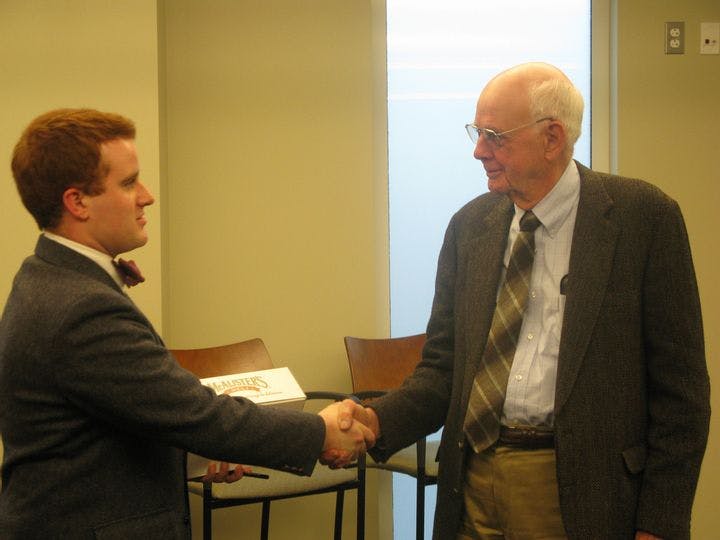Spring 2009
Personal History
– Gerald J. Russello
Gerald J. Russello on historian John Lukacs.
John Lukacs is one of the last great narrative historians. Over the course of his career he has written some 30 books, erudite histories accessible to the wider public, without much attention to academic fashion. His books on World War II remain essential reading, and his reflection on how we think about the past, Historical Consciousness (1968), is a classic.
Now in his eighties, Lukacs came to the United States from Hungary in 1946, a refugee from the emergent communist bloc. He found a home at Chestnut Hill College, where he has remained, deeply rooted in the small institution and in its hometown, Philadelphia, about which he wrote a discerning book. This dual heritage—a connection to the perhaps less understood eastern portion of Europe and his devotion to the Anglo-American civilization he found in the United States—is evident in much of his scholarship. Lukacs is a conservative who exasperates other conservatives; last year he penned a sharply critical review of Patrick J. Buchanan’s book on Adolf Hitler, and he has styled himself an “anti-anticommunist,” attributing Soviet aggression not to Marxism but to deep-seated features of the Russian national character.
Last Rites picks up the themes of Lukacs’s 1990 book Confessions of an Original Sinner, which he described as an “auto-history,” to distinguish it from autobiography. Like that earlier book, Last Rites is organized around his thoughts and beliefs rather than a linear life chronology. In it, Lukacs considers his native Hungarian pessimism and his ambient American optimism, explains his conviction that Winston Churchill almost alone saved Europe from Hitler, and writes sensitively and profoundly about his three marriages (he was twice widowed) and his children.
Lukacs is perhaps best known for his conviction that human knowledge is “participant,” and for holding that the barrier set up by Enlightenment thinking between subject and object is an illusion. History, properly considered, is not concerned with attaining objectivity, but with seeking understanding. “The ideal of objectivity is the total, the antiseptic separation of the knower from the known. Understanding involves an approach, that of getting closer. In any event, and about everything: there is, there can be, no essential separation from the knower and the known.” Drawing on his lifelong engagement with the work of the physicist Werner Heisenberg, Lukacs finds even scientists improperly focused on false “facts” in creating an illusory objectivity. For what makes a scientific fact of interest is primarily that we are there to observe it, and, as Heisenberg taught, our very observance changes the observed event itself.
This may seem simply postmodern avant la lettre, but to label it that would be to mistake Lukacs’s point. All does not dissolve into subjectivity. Because we are historical beings, our understanding of the past and the world around us must be a deeply moral and humbling enterprise. Humans invested the universe with meaning, according to Lukacs, and we are responsible for what we do with it. “The universe is such as it is because at the center of it there exist conscious and participant human beings who can see it, explore it, study it.”
Historian John Lukacs is a conservative who exasperates other conservatives.
In addition to providing a window into the mind of a great historian, Last Rites is a delight to read. Lukacs refers as easily to physics as to literature, and he includes intimate snippets from his unpublished diary. Witty and engaged, he has polished the art of the diverting footnote or illustrative anecdote to a high sheen. This makes his elegiac tone all the more striking. Like Jacques Barzun, George F. Kennan, and Samuel Huntington, Lukacs writes in defense of a lost world. He mourns the end of what he calls the Bourgeois Age—roughly the last 500 years of European civilization—which saw the development of cities and economic security, and, more important for Lukacs, the evolution of the “self” into its recognizable modern form.
* * *
Gerald J. Russello is the editor of The University Bookman.
Reviewed: Last Rites by John Lukacs, Yale University Press, 187 pp, 2009.
Photo courtesy of the McConnell Center
Up next in this issue
